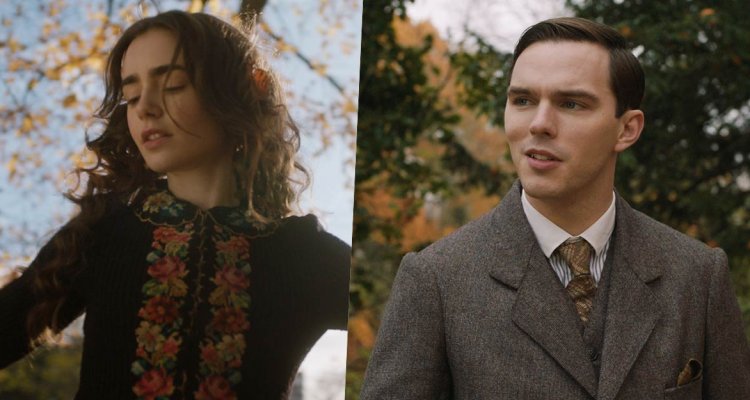There is no escaping the inevitable pandering when telling the life story of a figure such as “The Lord Of The Rings” author J.R.R. Tolkien in a biopic, especially considering the undeniable influence of Peter Jackson’s still unrivaled cinematic achievement. That said, it’s hard to believe that Tolkien ever saw a Balrog on the battlefield. But if there is research to the contrary, I rescind the statement.
READ MORE: the 100 Most Anticipated Films Of 2019
Structured around a disorienting and ineffective WWI framing device, “Tolkien” (starring Nicholas Hoult and Lily Collins and directed by Dome Karukoski) begins and ends with John Ronald Reuel receiving letters from an old schoolmate. Right away, the movie flashes back to J.R.R’s childhood and suffocates it with poor optical and editing decisions, many of which are truly the opposite of effective. The movie tells the viewer how to feel, when it’s convinced it’s showing us why Tolkien became a storyteller.
READ MORE: Summer Movie Preview: 35 Films You Shouldn’t Miss
Inspired by his mother’s love for the Newgate novel (which was also an important movement in the formation of another major post-war literature genre, the crime mystery), Tolkien purportedly grew up with shadows and symbols being projected onto bedroom walls and was homeschooled in several languages. His mother passed away when he was but a teen, and he was placed under the care of a religious guardian, Father Francis Morgan (grumbly, reliable Irish character actor, Colm Meaney) and essentially forced to study hard enough to ensure a scholarship from the prestigious Oxford university. Tolkien is initially an outcast upon arriving— correcting professors who mispronounce the preferred utterance of his given name. A rugby skirmish soon finds him falling into a friendship with three other academics (played by Anthony Boyle, Patrick Gibson, and Tom Glynn-Carney) who are clearly meant to be Hobbit surrogates.
When the four go on about naming an exclusive club for themselves, they suggest every possible word except the one every fan is already thinking. Tolkien soon finds himself smitten with a young opera enthusiast, Edith Bratt (Collins) who expresses great love for Richard Wagner (composer of the undeniably influential “Der Ring des Nibelungen,” or “The Ring Cycle“). When Tolkien introduces her to his new gregarious lounging buddies, the Pippin character (Glynn-Carney) scoffs that he appreciates Wagner’s work, but that it “shouldn’t take six hours to tell the story of a magic ring.”
The WW1 framing device is even less subtle—Tolkien served, fought as a young man and encountered much memorable trauma—and is only intermittently returned to. Opening with a black rider crossing blades with a white knight, this imagery goes nowhere, and is so gloomy and shrouded it almost feels more Joe Abercrombie than J.R.R. Tolkien. Maybe WWI’s legendary No Man’s Land is supposed to be what triggered Mordor in Tolkien’s imagination, but the volcanic and fantastical atmosphere isn’t captured properly. A gaseous cloud shades an armored figure lurking in the shadows and after emerging the dark rider doesn’t even look like a Nazgul. Tolkien lies in a ring-shaped river of blood; a flamethrower transforms into a dragon (you get the idea).
By the time the movie reaches its intended trench warfare climax, the audience may very well find themselves entirely emotionally disconnected from the WWI conflict, as the film’s strongest moments come from the sequences between Hoult and Collins, that frankly feel like outliers and have nothing to do with the film’s overall story agenda. They are both excellent in one lovely scene, though wherein Tolkien discovers the meaning of a word he’s invented by combining two others; cellar and door. Another sequence, with veteran actor Derek Jacobi, features a few beautifully nonsensical debates on the merits of vocabulary, as he and Hoult discuss how one comes to appreciate and understand why one might utter the word “oak” as opposed to simply calling the trunk a “tree.” These slightly ludicrous discussions are beautiful explorations of how exactly an author goes about creating “nonsense for the faeries.”
The camerawork also draws unnecessary attention to itself. The sweeping/swooping movement sort of makes sense for the trench warfare, but when the lens is flung across a library or down a common room staircase, it feels like it’s falsely attempting to evoke the epic cinematography of the late great Andrew Lesnie (who rightly won the Oscar for “Lord of the Rings: The Fellowship of the Ring”). Other decisions are odd too. The word Elvish isn’t mentioned once, but shows up in the requisite end title cards, assuming the audience is already invested in Middle Earth lore or Jackson’s trilogy.
“Men should be comrades, wherever they come from,” the Oxford Headmaster (played by Owen Teale, athe gleefully evil Alliser Thorne from “Game of Thrones”) instructs a young Tolkien. He stresses that where people come from shouldn’t matter, but then later scolds his student for letting friends into his billiard room one night. This contrast sort of sums up the film. “Tolkien” is an unfortunately typical biopic riddled with obvious influences and ham-fisted thematic hypocrisy, but it is effective in capturing the moral consequences key to the humanity of Tolkien’s masterpiece. Strangling itself with dull clichés and questionable kernels of real-life inspiration, the headmaster might as well have told the world-builder behind the “The Hobbit,” “Even the smallest person can change the course of the future.” [C]

